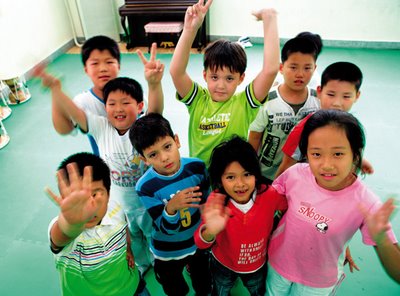Remember in one of the last Ask A Korean! News that I would talk more about the mail-order brides? Well here it is. Below is some excerpt from the report by Presidential Advisory Committee on Correcting Wealth Gap and Discrminiation, titled "International Marriage Brokerage System: Field Study at Vietnam".
At 2004, 11.4 percent of all marriages in Korea were between a Korean and a non-Korean. The number is as high as 27 percent in rural areas. Vietnamese women are a major subject of such marriages between Korean men and foreign women.
Usually Korean men are flown out to Vietnam for as long as 7 days or as short as 3 days, during which meeting, wedding, and honeymoon all take place. Korean men meet as few as 20~30 women or as many as 200~300 women per meeting. Between 5 to 10 Vietnamese women file into a room, the Korean man picks one among them, and the process is repeated for second and third round until one is chosen. Only at the last stage the man learns the age, edcuation, home town, family members, occupation, height, weight of the woman; the woman learns the man's occupation, economic standing and marriage history.
One Korean man who went through the process said: "it was very difficult to choose one among so many women after seeing them just for a moment. I was so nervous and no one really stood out. I was so hesitating that the marriage broker just picked one for me."
From the woman's side, it is virtually impossible to reject the marriage since being chosen already entails stiff competition; if she ever rejects, the "brokers" disadvantage her by never arranging her to meet another man. She also has to risk false information from the man's side about his occupation, etc. One woman recounted being told that her husband was a machinist earning $2,000 a month, only to find out that he was a daily laborer at a construction site when she came to Korea.
It is illegal in Vietnam to broker marriage for profit. Therefore this entire process is done underground. Smaller operations have around 15~30 women, and larger ones have 60~100 women. The women who are recruited are mostly from the southern, rural parts of Vietnam and generally are 19 to 25 year old primary school graduates. All women live together in a dormitory run by the broker. The women are charged with the cost of the dormitory, to be paid by their future husbands. The meeting takes place the day after the Korean man arrives Vietnam; the women (again, as many as 300 of them) are transported very early morning to avoid police detection. However, if the police ever catches them, it is their individual responsibility to run as best as she can, since the broker will assume no responsibility.
Officially the whole process costs around $10,000 (the Korean said in the earlier post that the cost was around $2,000. The Korean apologizes to the disappointed prospective buyers) for a Korean man to take a Vietnamese woman. The Korean brokerage company takes $6,500 and the rest goes to the Vietnamese brokers. Usually the Korean man gives to the bride's parents $500 as a dowery. But after taking out brokerage fee and so on, the actual amount that goes to the parents is about $180.
It takes 2~3 months for the women to obtain the entry visa for Korea. During that time the women learn Korean language, cooking Korean food and Korean manners. The cost of those lessons are again charged on the women.
Once the Vietnamese women come to Korea, they often suffer from domestic violence and jealous husbands who fear that they would run away. One woman said "As soon as I arrived at Korea my husband took away my passport and choked me. I am so afraid of him." Another woman said "I was hit by my husband three days after I entered the country. He demanded sex after coming home drunk; when I refused, he hit me in the face, pulled my hair and spat on my face."
Got a question or comment for the Korean? Ask away at askakorean@hotmail.com.










